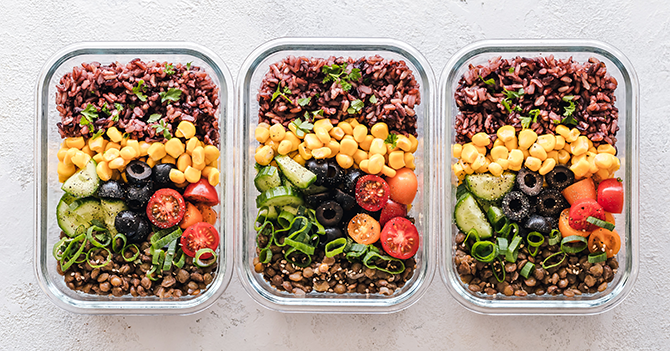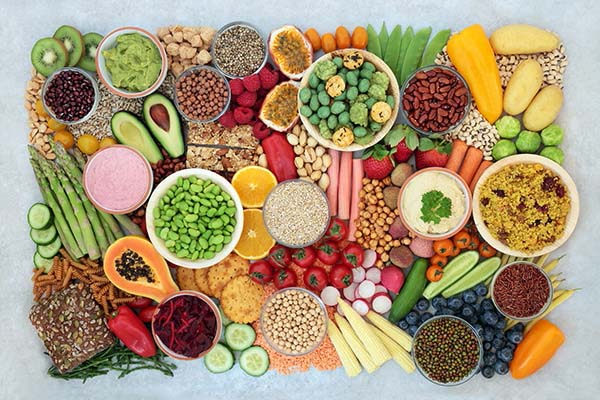The Ultimate Sugar Free Sauces Taste Test: Which One Wins?
Wiki Article
Everything About Healthy Food: Benefits of Embracing Plant Based Options
The discussion bordering plant-based diet regimens has actually gotten significant focus in recent times. Lots of people are discovering the possible health and wellness benefits, nutritional benefits, and ecological impacts related to these nutritional options. As people become extra familiar with their food's influence on health and sustainability, inquiries occur about the usefulness of embracing such a way of life. What specific adjustments can one expect, and just how might these options reshape not just personal wellness however also the world's future?Understanding Plant-Based Diet Regimens
Although lots of people link plant-based diets mostly with vegetarianism or veganism, these diet regimens can encompass a large range of consuming patterns that prioritize entire, minimally processed plant foods. Such diet plans frequently consist of fruits, veggies, whole grains, seeds, legumes, and nuts, while restricting or getting rid of animal items. This adaptability allows individuals to customize their nutritional choices according to individual choices and dietary needs. Some may embrace a largely plant-based diet while still sometimes consuming meat or milk, often referred to as a flexitarian technique. The focus stays on including even more plant foods, which can lead to a diverse variety of tastes and dishes. Understanding these various interpretations of plant-based eating is necessary for valuing its accessibility and appeal in contemporary food culture.Wellness Conveniences of Plant-Based Foods
The wellness advantages of plant-based foods are substantial, offering a nutrient density advantage that sustains total well-being. Research indicates that these foods can improve heart health and play an important role in efficient weight administration. By incorporating much more plant-based options, individuals may boost their nutritional selections and promote long-term wellness.Nutrient Density Advantage
Nutrient thickness plays a crucial duty in the wellness advantages of plant-based foods, making them a compelling option for those seeking a well balanced diet regimen. Plant-based foods, such as fruits, veggies, vegetables, nuts, and whole grains, are frequently rich in essential vitamins, minerals, and anti-oxidants while being reduced in calories. This high nutrient density allows people to take in fewer calories while still meeting their dietary requirements. Furthermore, these foods are packed with nutritional fiber, promoting gastrointestinal health and assisting in weight administration. By incorporating nutrient-dense plant-based alternatives, customers can enhance their total health and wellness, support their body immune systems, and minimize the risk of persistent illness. Ultimately, the nutrient thickness of plant-based foods underscores their relevance in a health-conscious way of life.Heart Health Enhancement

Weight Administration Support
Along with advertising heart health and wellness, a plant-based diet can significantly aid in weight monitoring. This dietary technique emphasizes entire foods such as fruits, veggies, vegetables, nuts, and entire grains, which are typically reduced in calories and higher in fiber contrasted to animal-based items. The high fiber content aids increase satiation, decreasing general calorie consumption. Plant-based diet regimens are frequently rich in crucial nutrients while low in undesirable fats, making it less complicated to maintain a healthy weight. Research study shows that people who adopt a plant-based way of life often tend to have reduced body mass indexes (BMIs) and experience even more effective weight loss compared to those who take in meat-heavy diet regimens. Consequently, embracing plant-based choices is a calculated selection for reliable weight management
Nutritional Worth of Plant-Based Active Ingredients
Plant-based active ingredients are abundant in essential nutrients, offering a diverse array of vitamins, minerals, and antioxidants that add to overall health. A contrast of healthy protein resources discloses that while pet products are typically considered as remarkable, lots of plant-based choices supply appropriate protein and other advantageous compounds. Understanding the dietary worth of these components can company website aid people make notified dietary choices.Essential Nutrients in Plants
Nutrient-rich components found in plants offer a varied variety of vital minerals and vitamins that contribute greatly to total health and wellness. These ingredients are abundant in vitamins A, C, and K, which sustain immune function, vision, and blood clot, specifically. Additionally, plants provide vital minerals such as magnesium, calcium, and potassium, important for heart health, muscular tissue function, and bone toughness. The existence of fiber in plant-based foods help digestion and promotes a healthy and balanced digestive tract microbiome. Anti-oxidants, found perfectly in vegetables and fruits, assistance combat oxidative stress and anxiety and decrease swelling. Lots of plant foods are reduced in calories yet high in nutrients, making them an outstanding selection for those seeking to preserve a healthy and balanced weight while guaranteeing excellent nutrient intake.
Contrasting Protein Sources
Protein resources differ significantly in their nutritional accounts, with plant-based active ingredients using special advantages. Unlike pet healthy proteins, which commonly include saturated fats and cholesterol, plant healthy proteins have a tendency to be lower in these unhealthy elements. Legumes, nuts, seeds, and whole grains are abundant in necessary amino acids, fiber, vitamins, and minerals. For example, lentils provide high healthy protein material alongside substantial iron and folate, while quinoa is a total protein, using all nine essential amino acids. Furthermore, plant-based proteins are commonly accompanied by anti-oxidants and phytochemicals that sustain overall wellness. The change to plant-based protein sources not only boosts nutritional consumption but additionally lines up with lasting nutritional techniques, minimizing environmental influence and advertising long-term health advantages.Ecological Effect of Plant-Based Consuming
As recognition of climate change grows, several individuals are exploring sustainable dietary selections that can greatly decrease their environmental footprint. Plant-based consuming has actually become a substantial contributor to decreasing greenhouse gas exhausts, which are mainly related to livestock production. The growing of fruits, grains, veggies, and legumes usually needs fewer sources, such as water and land, contrasted to pet farming. Additionally, plant-based diets can lead to reduced deforestation, as less land is required for grazing animals or growing animal feed. By moving in the direction of plant-based alternatives, customers can sustain biodiversity and advertise much healthier communities. In general, accepting plant-based consuming not only advantages individual wellness yet also stands for a crucial action towards environmental sustainability and preservation initiatives.Overcoming Common Misconceptions
While lots of individuals recognize the benefits of a plant-based diet, several misunderstandings typically deter them from completely accepting this lifestyle. A common idea is that plant-based diet regimens lack sufficient healthy protein; however, numerous plant sources, such as legumes, nuts, and tofu, provide enough healthy protein. Furthermore, some assume that this diet is pricey, when as a matter of fact, staples like beans, rice, and seasonal veggies can be quite inexpensive. Another misunderstanding is that plant-based consuming is excessively restrictive, whereas it really uses a diverse selection of flavors and foods. Lots of worry that a plant-based diet plan may lead to shortages, yet with proper preparation, individuals can acquire all necessary nutrients, consisting of minerals and vitamins, while taking pleasure in a wide range of delicious meals.Tips for Transitioning to a Plant-Based Way of life
Making the change to a plant-based way of life can be an enriching experience, though it often calls for some assistance to browse the initial adjustments. Individuals are motivated to begin gradually, integrating even more fruits, veggies, legumes, and whole grains into their dishes while lowering meat and dairy usage. Meal preparation is essential; preparing a regular menu can assist relieve the adjustment and avoid last-minute undesirable choices. Exploring new dishes and cooking approaches can additionally boost the experience and maintain enjoyment regarding plant-based eating. Furthermore, signing up with support system or areas can give inspiration and share beneficial ideas. Staying informed about nutrition assurances balanced meals, stopping deficiencies while cultivating a healthy and balanced, gratifying plant-based lifestyle.
Delicious Plant-Based Meal Ideas
Checking out scrumptious plant-based meal ideas can inspire individuals to embrace an extra nutritious diet. One prominent choice is a passionate quinoa salad, featuring cherry tomatoes, cucumber, and a vibrant lemon-tahini dressing. One more fave is a full-flavored lentil stew, loaded with carrots, celery, and great smelling herbs, best for a soothing dinner. For morning meal, over night oats made with almond milk, chia seeds, and topped with fresh berries supply a nutritious beginning to the day. Furthermore, a vibrant vegetable stir-fry with tofu and a range of vibrant veggies can be a quick yet pleasing dish. Finally, creamy avocado salute on whole-grain bread, sprinkled with flavors and seeds, uses an easy yet delicious snack. These dishes showcase the selection and splendor of plant-based consuming.
Regularly Asked Concerns
Can a Plant-Based Diet Offer Sufficient Protein?
The inquiry of whether a plant-based diet regimen can give adequate healthy protein is typical. Countless resources, including beans, nuts, seeds, and whole grains, can meet healthy protein needs successfully, sustaining a nourishing and well balanced diet plan for individuals.Are Plant-Based Diets Ideal for Children?
The viability of plant-based diet regimens for children depends upon cautious preparation. Ample nutrients need to be ensured, consisting of minerals, vitamins, and healthy proteins. With proper advice, such diet plans can support healthy development and growth in youngsters.How Do I Eat Out on a Plant-Based Diet regimen?
Eating in restaurants on a plant-based diet involves looking for dining establishments with diverse food selections, requesting modifications, and exploring vegan-friendly choices. Preparation in advance and interacting nutritional choices can enhance the eating experience see it here while maintaining nutritional options.What Are Common Irritants in Plant-Based Foods?
Typical allergens in plant-based foods include soy, gluten, nuts, and seeds - Plant Based Chicken. People complying with a plant-based diet ought to recognize these irritants and review tags thoroughly to avoid negative responses and guarantee secure consumptionCan Plant-Based Diets Help With Weight-loss?
Study shows that adopting a plant-based diet plan may help with weight management because of its typically reduced calorie thickness and higher fiber content. This mix can enhance satiation, helping individuals manage their caloric consumption efficiently. Many individuals connect plant-based diets mainly with vegetarianism or veganism, these diets can encompass a vast array of consuming patterns that focus on entire, minimally refined plant foods. Nutrient density plays a vital function in the health benefits of plant-based foods, making them a compelling selection for those looking for a click here for more balanced diet plan. Plant-based diet plans have been shown to considerably improve heart health, as they often include components that sustain cardiovascular feature. In enhancement to advertising heart wellness, a plant-based diet plan can substantially help in weight management. An usual idea is that plant-based diets lack enough healthy protein; however, countless plant resources, such as legumes, nuts, and tofu, offer ample healthy protein.Report this wiki page